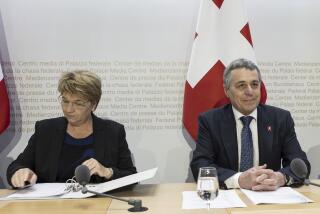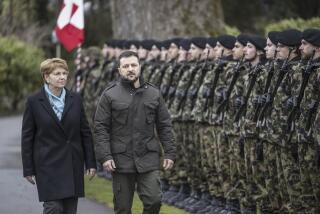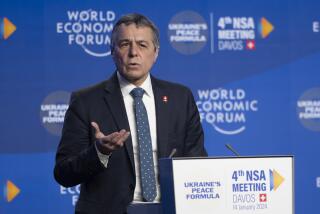Moscow Extends Invitation to Western Rights Group
- Share via
VIENNA — A Western group highly critical of Kremlin human rights policies has been invited to visit the Soviet Union and discuss its concerns with top officials, the Soviet ambassador to the Helsinki conference said today.
Moscow apparently approved the visit to coincide with today’s opening of the 35-nation Helsinki conference. Participants hope it will be the final round in resolving conflicts on human rights and conventional disarmament.
The visit to the Soviet Union by the International Helsinki Foundation would be the first of its kind by a private Western group. At a news conference, Yuri D. Kashlev said members would be allowed to meet with top Soviet officials.
Gerard Nagler, senior representative of the federation, said a 12-member delegation from various Western European countries will go to Moscow in November for five days. He said the group first requested the visit in June.
Details Reported
Nagler said the Soviet Embassy in Vienna told him delegates will be allowed to meet with high-level officials in the Justice, Interior and Foreign Affairs ministries. The group also has made clear it intends to meet several dissidents in Moscow, Nagler said. He did not identify them.
The Helsinki conference, the third review of the 1975 Helsinki accords on security and cooperation in Europe, began last November and was supposed to wind up after this summer’s session.
The Helsinki accords aim to facilitate a freer flow of people and ideas as well as peaceful coexistance between East and West.
Attending the conference are the United States, Canada, the Soviet Union and all European states except Albania.
Western diplomats said they hope for agreements on human rights and security issues by Christmas.
The U.S.-Soviet agreement in principle on a treaty eliminating medium-range nuclear weapons is expected to improve the chances of an accord. Superpower talks on human rights in Washington last week also showed signs of Soviet flexibility on issues like Jewish emigration, Western diplomats said.
The diplomats said security issues would likely receive most of the conference’s attention because of the arms accord.
East and West have been haggling over reduction of conventional forces in Europe since February, when NATO and Warsaw Pact nations opened talks on the issue.
More to Read
Sign up for Essential California
The most important California stories and recommendations in your inbox every morning.
You may occasionally receive promotional content from the Los Angeles Times.













